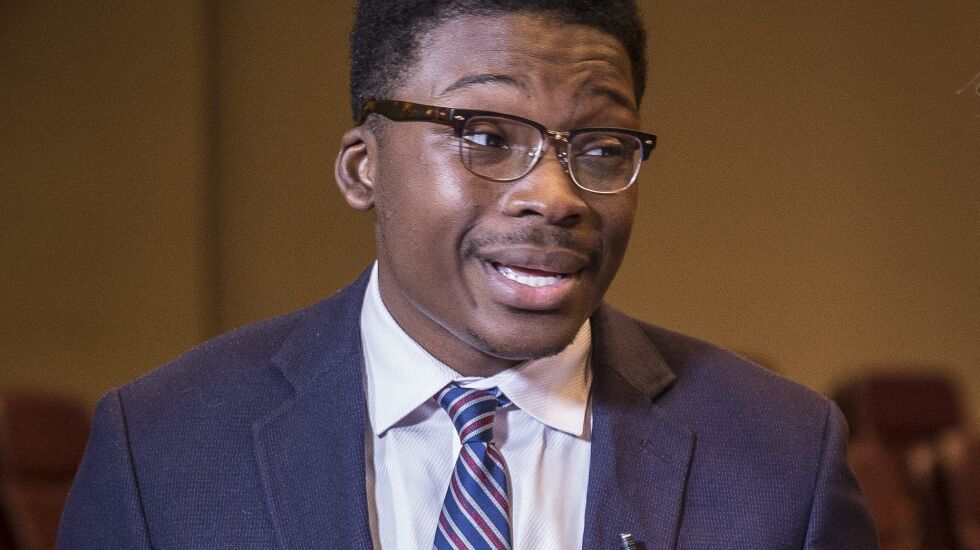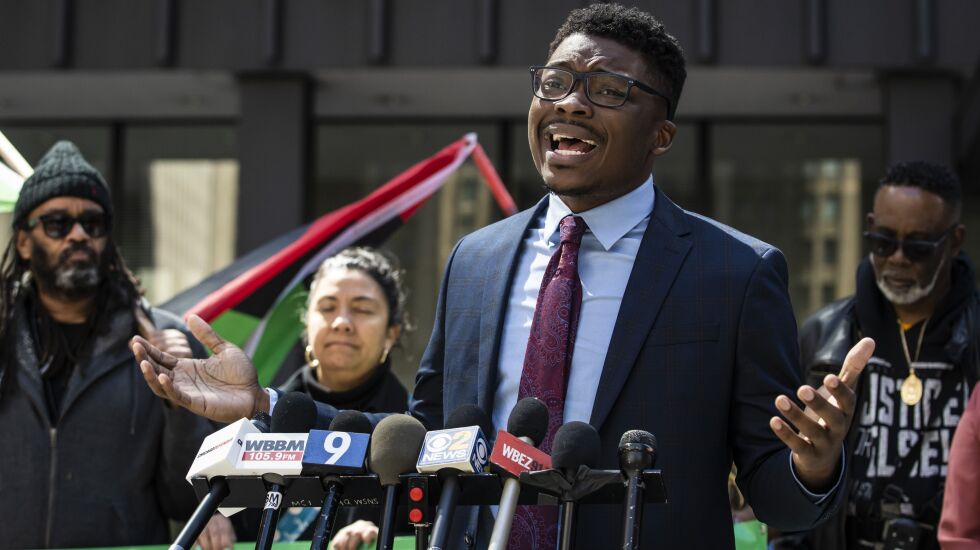
Albert Einstein famously defined “insanity” as “doing the same thing over and over and expecting different results.”
With that in mind, mayoral challenger Ja’Mal Green on Tuesday unveiled a sweeping, $5 billion public safety plan to confront the violent crime that is foremost on the minds of many Chicago voters.
Like incumbent Mayor Lori Lightfoot, Green’s approach attacks what he calls the “root causes” of crime: entrenched poverty, neighborhood neglect, homelessness, joblessness and despair.
Unlike Lightfoot, Green said he won’t accept incremental progress. He’s pushing the envelope in every possible direction, hoping to deliver speedy results.
His plans include a universal preschool program for 3-year-olds; 10,000 year-round apprenticeships for people ages 13 to 25; and making Lightfoot’s guaranteed minimum income pilot a permanent program, doubling its participants to 10,000 and monthly paycheck to $1,000 — with strings attached.
He also said he wants to reopen mental health clinics as holistic “healing houses”; dole out 100,000 Apple or Samsung “air tags” to motorists to reduce the number of carjackings; install image sensors, cameras, concealed speakers and “emergency blue light call stations” on targeted blocks; and create an armed and unarmed “Transit Peace Keepers Protection Agency” to reduce CTA crime.
The youngest of nine mayoral candidates, the 28-year-old Green said his crime-fighting ideas would cost $5 billion to fully implement. The youth apprenticeship program alone would cost $150 million a year for 10,000 jobs. So would the expanded minimum income program.
But he argued the city and Chicago Public Schools can afford it, and there is no other choice to restore the sense of safety needed to reverse the Black exodus from Chicago and solve the city’s affordable housing crisis.
“There’s no such thing as, ‘It’s too much to create a safer city.’ Businesses are leaving. Families are leaving at a record [pace]. Young people are hopeless. Young people are carjacking. Young people are killing and being killed in our city. We’re in a state of emergency. And we can’t continue to do the same things that aren’t working,” Green said.
“This is the approach that has never been done. We have, year after year, tried to crack a whip and increase the police budget and increase the amount of officers. It’s never worked. This is the way that we can decrease violence and get to a point where it’s at levels never seen before — where it almost is nonexistent.”

A community activist making his second run for mayor, Green is campaigning on a promise to create 10,000 new homeowners to repopulate South and West Side communities, in part, by creating a “Bank of Chicago.”
His public safety plan builds on that promise, but goes far beyond it to more quickly reduce a 120,000-unit shortage of affordable housing that, he claims, will take decades to eliminate with the “trickle” of affordable housing the Lightfoot administration is now creating.
Green said he will keep the promise Lightfoot broke to raise the real estate transfer tax on high-end home sales to create a dedicated funding source to create affordable housing and reduce homelessness. But he also said he wants to offer city subsidies to developers of big-box stores, groceries, banks and churches who agree to build affordable housing above their ground floors.
He also said he wants to relax zoning rules to allow the owners of single-family homes to “build affordable units a floor above.”
Although his plan is heavily tilted toward confronting causes of crime and beefing up alternate-response programs to mental health emergencies, Green isn’t ignoring problems at the Chicago Police Department, where canceled days off have demoralized Chicago police officers retiring faster than replacements can be hired.
Like retiring Ald. Sophia King (4th), Green said he wants to shift officers to four-day work weeks. Unlike King, he would work them for 12-hours a day for two straight days with a “mental health day” in between, followed by two more 12-hour-days.
Officers buying their first home would get down payment assistance. Background checks would be relaxed. And every one of the city’s 22 police districts would finally have their own clinicians to counsel troubled officers in hopes of stopping a wave of officer suicides.
Green also said he wants to abolish the gang database, require officers to carry liability insurance to cover the cost of misconduct lawsuits against them and levy $5,000 fines against officers who turn off their body cameras.
A city-run version of the “Citizen” app also would be created to keep tabs on “verified” crimes and allow Chicagoans to rate their interactions with officers.
“It’s a very balanced plan, in my view, and a lot of officers’ views,” Green said. “They’ve got things in there that they don’t like and things that they will. But we have to get to a common ground.”







